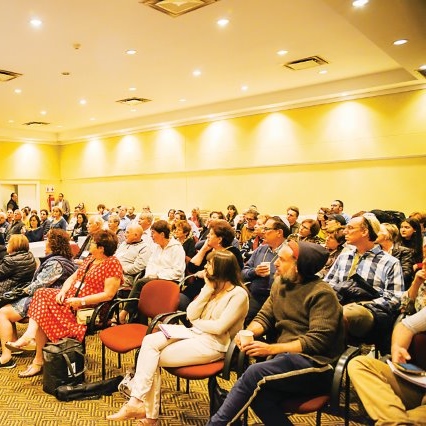
Featured Item

From milk and honey to tea and scones: dispatches of an Israeli diplomat
MIRAH LANGER
Taub delighted attendees at Limmud last weekend with anecdotes and insights into his time in England, from the tale of a teddy bear in the mail, to moving meditations about a Hebrew performance of The Merchant of Venice at London’s Globe Theatre.
“I remember a British diplomat in Israel who came to me and said something interesting, ‘I’m very jealous of you Israeli diplomats’.” When he asked the diplomat why he felt this way, the man replied it was because Israeli diplomats “really seemed to have a mission”.
While all diplomats are committed to their work, Taub proposed that his comment had definitely “plugged into something” about the particularities of the Israeli mission.
“For Israelis, there is something a little deeper, [something] that it is about national integrity. You feel it when you stand in front of the wall of the Israeli Foreign Ministry, when you see the names of all those diplomats who have fallen in the course of their duty.”
He said there were other particularities to the experience of those in the Israeli diplomatic service including the added stress of knowing that everything said in public “could be taken and made into a headline, representing your whole country”, quipping that, “particularly if you are an Israeli who is used to speaking your mind, it can be very pressuring”.
Yet, even the disproportionate international scrutiny of Israel had an upside, Taub suggested, because it gave diplomats “extraordinary access” to top political leadership which other countries would struggle to obtain.
For Taub, the most difficult time of his post was during military conflict back home, a situation that has occurred twice. “In both cases, we had kids in the armed forces in Gaza or on the border.”
Against this reality, being in London was a jarring experience. “It’s extraordinarily difficult because you find yourself dressing up in a tuxedo and going to some fancy event, yet you know what’s going on at home.”
While at times he tried to persuade himself it was “a recreation of the early Zionist movement, when you have people draining marshes on the one hand, and the Weizmanns going round the salons of Europe on the other, there is only so far you can go with that”.
Overall, suggested Taub, the diverse experiences of the London embassy were encapsulated by the varied contents of its postbag.
“On the one hand, it would consist of extraordinarily lovely letters from Christian evangelical supporters.” Taub recounted how “one time, they even sent a teddy bear to cheer us up, causing an argument between two secretaries over who would get to keep it”.
In the end, the only solution to restore peace in the office was for him to go out and buy a second teddy bear.
On the other hand, the embassy also received “genuinely vicious hate-mail”. “There are pockets of extraordinary hostility in parts of academia, the trade unions, and the media, for example.”
He recalled how sometimes moving experiences even manifested from troubling situations.
For example, a plan by the Globe Theatre to invite 36 countries to perform a Shakespeare play in their national language became politicised when it came to Israel.
Tension arose over the theatre’s decision to ask an Israeli theatre company to perform The Merchant of Venice, a play known for its controversial representation of Jewish character Shylock.
Soon there was a campaign in Britain to boycott and disrupt the Israeli performance.
The embassy kicked into high gear, and by the time Taub and his wife actually went to attend the performance, they were somewhat exhausted by the situation.
Thus, it was to his surprise that he turned out to be deeply affected by what unfolded before him. “It was extraordinarily moving to see, in this theatre which had risen from the ashes [the Globe burnt to the ground in 1613, later being rebuilt], this Shakespeare play, performed in Hebrew, a language which itself had risen from the ashes,” he reminisced.
“I couldn’t help thinking, ‘here is a play about the Jews, performed by the Jews. Before, we hadn’t been able to say anything about it, and now, we have a national theatre company that can come and give its own interpretation in its own language.’”




